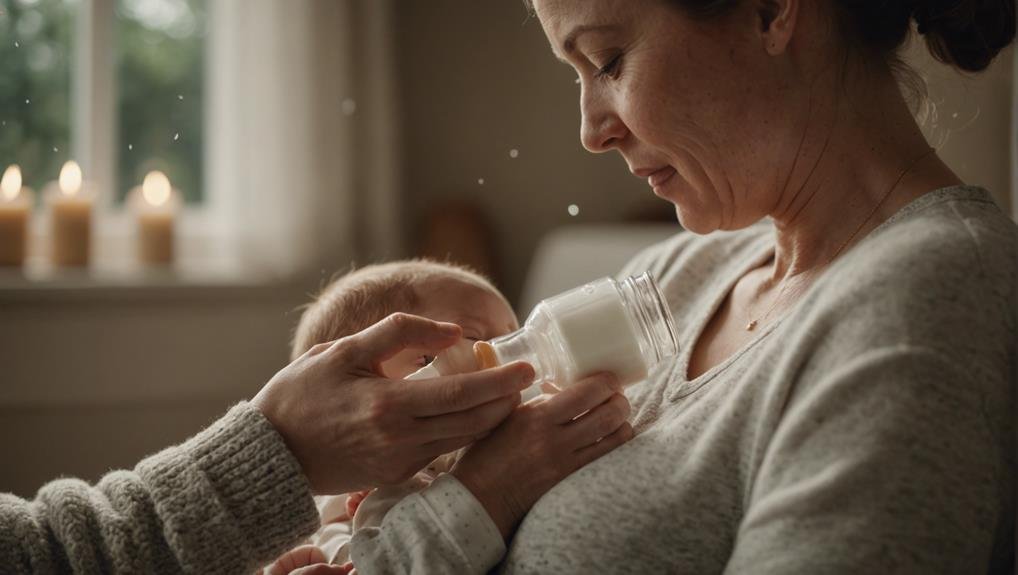"Cherishing Little Steps - A Haven for Baby and Family Journeys"
Baby Care
When it comes to caring for a baby, the journey is both rewarding and demanding. As a caregiver, you hold the key to fostering a secure and nurturing environment for the little one. From mastering the art of swaddling to deciphering the language of cries, every moment spent with the baby is a chance to learn and grow together. But what truly sets the foundation for a healthy and thriving baby is the delicate balance of meeting their needs while creating moments of joy and connection.
Feeding

When caring for your baby, feeding is a crucial aspect that requires attention and care. Breastfeeding offers numerous benefits, such as providing essential nutrients and boosting your baby's immune system. As you navigate this journey, weaning techniques play a significant role in transitioning your baby to solid foods. Introducing solids can be exciting but also requires patience as your little one explores new tastes and textures.
In addition to breastfeeding, bottle sterilization is essential to prevent infections and ensure your baby's health. Make sure to sterilize bottles thoroughly, especially when your baby is still young and vulnerable to germs. It's a simple step that can make a big difference.
As your baby grows, pay attention to cues that they may be ready for solids. Look for signs like increased interest in food, good head control, and the ability to sit with support. When introducing solids, start slowly and offer single-ingredient foods to monitor any potential allergies. Remember, every baby is different, so be patient and enjoy this new phase together.
Diapering
To ensure your baby's comfort and hygiene, mastering proper diapering techniques is key in your caregiving routine. When it comes to diaper rash prevention, it's crucial to change your baby's diaper frequently, clean their bottom gently with each change, and allow their skin to air dry before putting on a new diaper.
For some babies, cloth diapers are gentler on the skin as they're free from chemicals found in some disposable options. However, disposable diapers are more convenient, especially when you're on the go.
Nighttime leakage can be a common concern for parents. Consider trying different diaper brands to find one that offers better overnight protection. Some brands are specifically designed for long hours, helping to keep your baby dry and comfortable throughout the night.
Remember to check the diaper's fit to ensure it's snug but not too tight, as this can also help prevent leaks. Mastering the art of diapering won't only keep your baby happy but will also make your caregiving routine smoother and more efficient.
Bathing

Mastering the proper techniques for bathing your baby is essential for ensuring their cleanliness and comfort in your caregiving routine. When it comes to bathing your little one, it's crucial to pay attention to details like bath temperature, baby products, bath toys, and skin care. Here are some tips to make bath time an enjoyable experience for both you and your baby:
| Bath Temperature | Baby Products | Bath Toys |
|---|---|---|
| Check with a bath thermometer to ensure the water is around 37°C (98.6°F). | Use gentle baby wash and shampoo to keep your baby's delicate skin clean. | Incorporate fun bath toys to make the experience enjoyable and engaging. |
| A comfortable water temperature helps prevent your baby from getting cold. | Opt for mild, hypoallergenic products to avoid irritation. | Floating rubber ducks or colorful cups can make bath time playful. |
| Always test the water temperature with your elbow or wrist before placing your baby in the bath. | Consider baby-safe bubble bath for extra fun during baths. | Bath books or squirt toys can add an educational element to bath time. |
Remember to pat your baby's skin dry gently and apply a moisturizer after the bath to keep their skin soft and hydrated. Enjoy this bonding time with your little one while keeping them clean and happy.
Sleeping
Maintaining a consistent bedtime routine is key to helping your baby develop healthy sleeping habits. Sleep training plays an essential role in establishing a predictable schedule for your little one.
Setting a nap schedule can aid in regulating your baby's sleep patterns and ensuring they get the rest they need. It's important to create a calming bedtime routine that signals to your baby that it's time to wind down. This could involve activities such as reading a bedtime story, dimming the lights, or giving a soothing bath.
While some parents opt for co-sleeping, experts recommend having your baby sleep in a separate crib or bassinet to promote safe sleeping habits. Remember to place your baby on their back to sleep to reduce the risk of Sudden Infant Death Syndrome (SIDS).
Soothing

Establishing effective soothing techniques can help calm your baby and create a sense of security and comfort in their daily routine.
Swaddle techniques can mimic the feeling of being snug in the womb, providing a sense of security for your little one. Wrapping your baby gently but securely in a swaddle can help reduce their startle reflex and promote better sleep.
Using white noise, such as a fan or a white noise machine, can help drown out other sounds that may startle or disturb your baby. The consistent sound can create a calming environment that mimics the familiar noises from the womb.
Engaging in baby massage can be a soothing experience for both you and your baby. The gentle touch and rhythmic movements can help relax your baby and promote bonding between the two of you.
Consider babywearing as another soothing technique. Keeping your baby close to you in a carrier or sling can provide comfort and security while allowing you to move freely and attend to your daily tasks.
Development
As your baby grows, understanding their developmental milestones is key to providing the necessary support and stimulation for their progress.
Cognitive milestones, such as recognizing faces or babbling, are exciting to witness. Engage your little one with sensory stimulation like colorful toys or gentle music to promote their cognitive development.
Social skills are also crucial at this stage. Encourage interactions with family members and other babies to help them learn about relationships and emotions.
As you bond with your baby, they develop a sense of security and trust, laying the foundation for healthy emotional growth.
Safety

Prioritizing the safety of your baby is paramount to creating a secure environment for their well-being and development.
When it comes to childproofing basics, ensure all electrical outlets are covered, sharp corners are padded, and hazardous substances are out of reach. Regularly check for small objects that could pose a choking hazard. Installing safety gates at stairs and securing furniture to walls are also crucial steps in creating a safe space for your little one to explore.
When it comes to car seat guidelines, always follow the manufacturer's instructions for installation and usage. Make sure the car seat is rear-facing for infants and toddlers until they reach the appropriate weight and height to be turned forward-facing. Double-check the harness straps are snug and positioned correctly. Avoid using second-hand car seats as they may not meet current safety standards.
Playtime
Ensuring your baby has a safe and stimulating play environment is essential for their growth and development. Playtime isn't just about fun; it's a crucial aspect of your baby's early years. Through sensory exploration, your little one learns about the world around them.
Providing toys with different textures, shapes, and colors can help enhance their cognitive development. Interactive bonding during playtime strengthens the emotional connection between you and your baby, fostering a sense of security and trust.
Encouraging play that promotes motor skills, such as reaching for toys or crawling, is beneficial for their physical development. Simple activities like tummy time can help strengthen their muscles and improve coordination.
Additionally, engaging in playful interactions like peek-a-boo or singing nursery rhhymes stimulates their brain, laying the foundation for cognitive growth.
Health

Maintaining your baby's health is a top priority for their overall well-being and development. Keeping up with vaccination schedules is crucial to protect your little one from serious illnesses.
It's normal for babies to experience common illnesses like colds and fevers, but always consult your pediatrician if you have concerns.
Teething can be a challenging time for both you and your baby. To ease their discomfort, try giving them a clean teething ring or gently massaging their gums with a clean finger.
Baby massage isn't only a soothing way to bond with your little one but can also help with their digestion and sleep. Remember to use gentle and rhythmic strokes while ensuring a warm and quiet environment.
Parenting Tips
When caring for your baby, it's essential to establish a routine that promotes a secure and nurturing environment for their growth and development. Bonding activities are crucial for creating strong emotional connections with your little one. Spend quality time engaging in activities like singing lullabies, gentle massages, or simply cuddling. These moments not only strengthen your bond but also aid in your baby's emotional development.
Tracking baby milestones is another vital aspect of parenting. Celebrate each milestone, whether it's the first smile or the first step. These moments are precious and mark your baby's growth and progress. Remember, every baby develops at their own pace, so enjoy the journey while supporting their individual milestones.
Amidst the joy of parenting, don't forget about self-care. Taking care of yourself is essential for being the best parent you can be. Seek parenting support when needed, whether from friends, family, or support groups. Remember, you aren't alone on this journey, and it's okay to ask for help. Prioritize your well-being to provide the love and care your baby needs.
Frequently Asked Questions
How Can I Encourage My Baby's Curiosity and Exploration?
To encourage curiosity and exploration, you can foster a love for discovery through outdoor adventures and sensory play. Engage in DIY sensory toys and let your child lead the exploration for a hands-on learning experience.
What Are Some Ways to Introduce My Baby to New Textures?
To introduce your baby to new textures, engage in sensory play activities. Let them explore through baby-led weaning or messy play with sensory bins. These experiences will help develop their tactile senses and curiosity.
When Should I Start Thinking About Baby-Proofing My Home?
When should you start thinking about baby-proofing your home? Child safety experts recommend starting this process before your little one becomes mobile, around 6-8 months. Creating a safe home environment is crucial for your child's well-being.
Is It Normal for My Baby to Have Different Sleep Patterns?
Yes, it's normal for babies to experience different sleep patterns due to sleep regression. To cope, establish a consistent bedtime routine, create a soothing environment, and be patient. Sudden changes in sleep routines are common but can improve with time and gentle adjustments.
What Are Some Creative Ways to Bond With My Baby?
When it comes to bonding with your baby, sensory play and baby massage can create meaningful connections. Engage in music time and baby yoga to further deepen your bond. These activities foster closeness and enhance your relationship.
Conclusion
Congratulations, you've mastered the art of baby care! You've become a diaper-changing ninja, a feeding expert, and a soothing superstar.
Remember, parenting is like a never-ending rollercoaster ride, so buckle up and enjoy the journey. And hey, if all else fails, just remember that caffeine is your best friend.
Keep up the great work, you're doing amazing!




